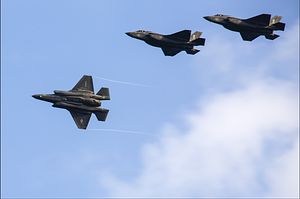Taiwan has once more expressed its interest in procuring Lockheed Martin’s F-35 Lightning II Joint Strike Fighter for the Republic of China Air Force (ROCAF).
Taiwan’s Minister of National Defense Yen Teh-fa told Taiwanese lawmakers during a meeting of the National Assembly’s Foreign Affairs and National Defense Committee that the F-35B, the U.S. Marine Corps’ short take-off and vertical landing (STOVL) variant of the supersonic fifth-generation fighter jet, matches the ROCAFs requirements.
However, Taiwan has not made an official request to purchase the aircraft from the United States so far. In April 2017, Taiwan’s then-Defense Minister Feng Shih-kuan told the Foreign Affairs and National Defense Committee that he would formally declare Taiwan’s intention to purchase the F-35 stealth fighter during a visit to Washington in July. Yet, no announcement was made at the time. As I reported last year:
Taiwan first expressed interest in the F-35B variant (…) in May 2002. Taiwan officials cited a need for up to 100 F-35B aircraft at the time. However, U.S. officials rebuffed the request along with earlier requests for upgraded F-16 fighter aircraft. (In 2011, U.S. President Barack Obama eventually agreed to upgrade the Republic of China Air Force’s fleet of around 140 F-16s.)
The United States continues to be noncommittal on the subject of the F-35. “In accordance with the TRA [Taiwan Relations Act], we will continue to make available to Taiwan defense articles and services necessary to enable Taiwan to maintain a sufficient self-defense capability,” American Institute in Taiwan, the de facto U.S. Embassy, spokeswoman Sonia Urbom told the Taipei Times last week. “We continue to review Taiwan’s defensive needs on an ongoing basis and will consult with Congress as required.”
As I explained previously, procuring the F-35B might be unnecessary extravaganza given Taiwan’s relatively modest defense expenditures (See: “Why Selling F-35s to Taiwan Is a Terrible Idea”). Furthermore:
(…) F-35s would be highly vulnerable to destruction on the ground by the People’s Liberation Army Air Force (PLAAF) or Chinese ballistic missiles before they could even take off, offsetting any advantage Taiwan would gain from procuring the fifth generation fighter jet. (…)
Even if some F-35s were to survive [an] initial [Chinese] onslaught, the aircraft would quickly be robbed of their necessary support infrastructure to continue operations. Consequently, should some F-35s manage to take off, it would likely be for a single sortie given the high probability that they would not have a functioning airbase to return to.
Taiwan’s defense needs would be better served if the government decides to invest additional resources into acquiring new highly mobile medium- and long-range surface-to-air missile (SAM) defense systems. As I calculated last year: “Should Taiwan decide to abandon its fighter fleet (which would include divesting from the idea of acquiring F-35s), it would have $25 billion in funds available to acquire new SAM defense systems in the next 20 years.”

































